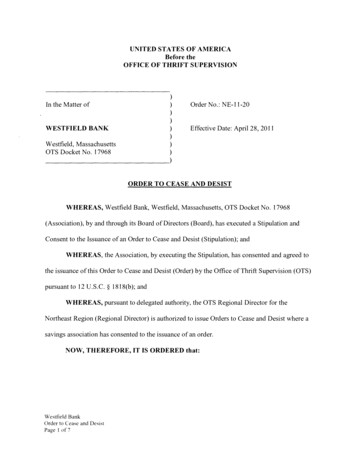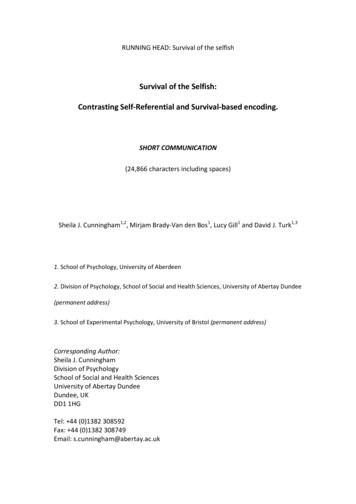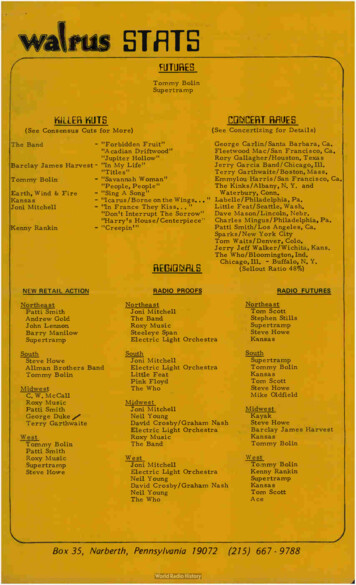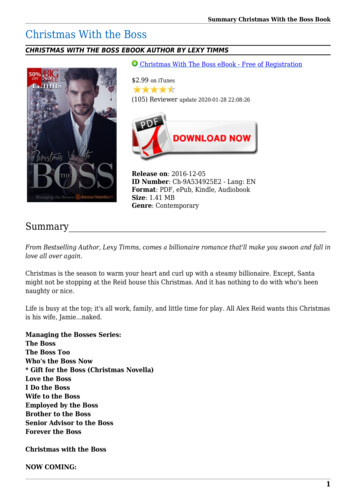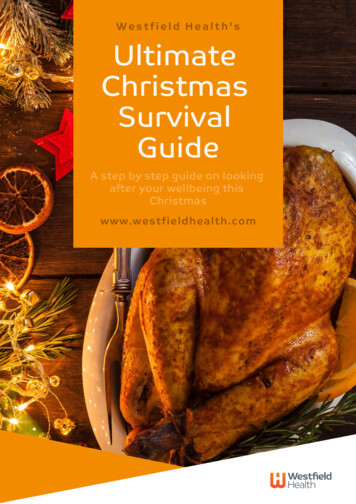
Transcription
Westfield Health'sUltimateChristmasSurvivalGuideA step by step guide on lookingafter your wellbeing thisChristmaswww.westfieldhealth.com
UltimateChristmasSurvival GuideBy Westfield HealthOur Ultimate Christmas Survival Guide offers practical advice onsurviving the festive season, covering four areas of health andwellbeing:About Westfield HealthWe’re dedicated to making a healthydifference to the quality of life of ourcustomers and the communities inwhich they live and work.We inspire and empower each otherto be the best that we can be, so wecan deliver evidence-based healthand wellbeing solutions that supportpeople, communities, andworkplaces to be healthier.We’re proud of our not for profitheritage and are passionate aboutmaking a healthy difference. We haveno shareholders, so the moresuccessful we are the more we cangive back to those around us.1How to eat well2How to keep active4Coping with stress7How to sleep better10
How to eat wellthis ChristmasBy Richard HolmesRichard is Director of Wellbeing atWestfield health. He has dedicatedhis career to improving people’squality of life. He’s passionate aboutthe impact of health and wellbeingon business and individualperformance, and managesWestfield Health’s exclusivepartnership with Sheffield HallamUniversity’s Advanced WellbeingResearch Centre.Richard has been cited in, andcontributed to, a number ofwellbeing articles across trade andconsumer titles, including The Metro,Employee Benefits and OccupationalHealth.2What springs to mind when you think about Christmas?Presents? Sleigh bells? Tinsel? But what’s the thing we all lookforward to the most? You guessed it - the food!We love to indulge in our favourite festive foods over theChristmas period. From mince pies and selection boxes toChristmas dinner with all the trimmings. Even your workplace canbecome inundated with sweet treats, but it’s important to makesure that we are more mindful of our nutrition while enjoying aChristmas cookie or two.If you’re worried that you’ll fall off the healthy eating bandwagonor want some advice on how you can keep your body wellnourished, we’ve got some top tips on how to eat well over theChristmas period.
Eating outChristmas is in the air and it seems that everyweekend in December is booked up with Christmasdos, friendly catch ups and festive lunches. It can behard to stick to our healthy eating habits while eatingout, so here’s how you can enjoy yourself while eatingout, but make smart choices:Shake off the saltIt’s recommended that adults eat no more than 6g salt aday, which is easy to keep track of when you’re cookingdinner or buying lunch from the supermarket, but whatabout when you’re eating out? Here’s how you can cutdown on salt when eating out or ordering in:When you order a pizza, choose a vegetable or chickentopping instead of pepperoni, bacon, or extra cheese.If you’re having a pasta dish, choose one with a tomatobased sauce with vegetables or chicken, rather thanbacon, cheese or sausage.Braving the buffetBuffets can be dangerous for anyone who loves theirfood because before you know it you’re four plates deepand 1000 calories over your daily recommended amount.Try loading your first plate with healthy options, like leanmeats and vegetables, before you head for the calorificsides.Hangover foodIs seems temptation is around every corner in December,but eating the wrong food can make you feel sluggish andlethargic. It’s hard not to reach for the crisps, fast food orbacon sandwich the morning after the night before, but tryout these tips on a hangover to help you feel better:Rehydrate to help deal with the painful symptoms anddrink bland liquids that are easy on the stomach, likewater and soda water.Eat a veggie soup – try a bouillon, a thin vegetable-basedbroth which has a good source of vitamins and mineralsand is easy for the stomach to digest.Sugary foods can help you feel less trembly.Fruit smoothies with potassium rich foods like bananas,apricots and oranges help replenish the electrolytes lostdue to the diuretic effects of alcohol.3Hydration is keyDrinking a minimum of 1.2 litres can not onlyimprove the condition of your skin, it improvesdrowsiness, headaches, concentration and energylevels. Most of us enjoy the odd boozy night, butaround the festive build up we’re out socialisingmore and enjoying a Christmas tipple or two. Weknow we’re a little worse for wear after a night onthe beer, so keeping hydrated to help your bodyrepair is essential.Here’s how you can keep hydrated on a night out,avoid that horrendous hangover and hopefully a redfaced moment after a Christmas do:The more alcohol you drink, the less water yourbody retains, so drink plenty of water before yougo out.Try alternating between an alcoholic and a softdrink to help to reduce the amount of alcohol youdrink.Avoid dark drinks as they contain more alcoholictoxins which contributes to hangovers. Drinkingwater will help to flush out these toxins andminimise their effect.Eating isn’t cheating, the presence of food in thestomach will help delay the absorption of alcoholinto the blood and stop you getting drunk veryquickly. Don't be tempted to skip meals so youcan stockpile calories for drinking, you’ll bemissing vital nutrients your body needs fromfood.Try drinking coconut water, it helps to hydrateyou quicker because of its electrolyte content(including potassium).
How to keepactiveBy Barry WoodBarry is managing director at SevenHills Fitness, and is dedicated toproviding people with access to thehighest standard of personaltraining, whether this be at home orin the workplace, or any time overthe web.As well as providing world classphysical training, Barry also offersnutritional and goal setting advice tohelp people achieve their goals. He ispassionate about smashing downthe barriers preventing people frombecoming the best version ofthemselves, helping people tobecome fitter and healthier.4The Christmas build up has begun and in the middle of the neverending to do list, finding time to exercise can be a challenge.We're out socialising on Christmas dos and up late onlineshopping for the perfect present, add that to the dark, coldnights, it seems easier to flop onto the sofa with a ready mealinstead of dragging yourself to the gym.But keeping up with exercise still needs to be on your agenda tokeep you fighting fit for Christmas. We've put together our toptips on how you can keep yourself motivated and active over thecountdown to Christmas.
Our top tipsfor keepingactiveMake a plan with friendsCommit to at least a couple of nights a week with afriend or colleague to exercise together. It could be anexercise class, a jog around the park, or just a powerwalk on your lunch break. Exercising with a friend canbe fun and a great help in supporting you to continuewith your fitness programme. Plus, you'll be less likelyto cancel last minute because you won't want to letyour friend down!Join the digital revolutionIf the shopping and socialising has booked you out forthe next few weeks and you can't make it to yourregular exercise class or gym, try using that spare 20minutes to do a quick work out at home with a digitalbootcamp or DVD.Walk, walk and walk somemoreWalking is such an easy and often neglected form ofphysical activity that you can easily incorporate intoyour everyday life. Here's a few ways to up your stepgame:Get on your woollies and walk to work! Or if yourcommute isn't walkable, park further away or get offthe bus a couple of stops earlier.Arrange walking meetings.Track your steps with wearable technology or an app,you could hold a healthy competition and see who cando the most steps each week.Don't draft that email or dial that phone number, getup and talk to your colleagues if they're in yourbuilding.Use the stairs instead of the lift.5Move more at workResearch has found that some employees spendbetween 5-8 hours per day sitting at desks which canbe a huge health risk. Try getting up and moving awayfrom your desk every hour, you could:Use the printer/kitchen at the other end of the office.Get out of your chair every 60 minutes to move andstretch. Even the slightest movement will increaseblood circulation, bringing oxygen and vital nutrientsto the body and mind.Sit less – have walking or standing meetings. If longmeetings are unavoidable, have a 5 minutemovement break every hour to stretch and movearound. You'll be surprised how much more focusedand attentive people will be afterwards!Got no energy?If you're shattered from work and planning forChristmas, the last thing you should do is exercise,right? Wrong! Exercising will give you more energy ifyou're feeling lethargic. If you're feeling drained from astressful week, exercise can be a great way of relievingthat built up tension.Become a health heroWe all know someone who takes part in sport, anexercise class or another form of physical activity.Track them down and find out if anyone else wants tojoin in the activities. From joining a netball team ordoing some lunchtime yoga, to creating a 5 a sidefootball team, find out from colleagues if they'd beinterested in starting up a new activity to get fittogether.Top tip: To really feel the benefits of walking,walk at a pace that makes you breathe a littlefaster, feel warmer and slightly increasesyour heart rate.
Be the NEATest person inthe officeNon-exercise activity thermogenesis (NEAT) is theenergy expended for everything we do that isn'tsleeping, eating or exercising. It can be anything fromwalking to work, typing, housework and even fidgeting.Every movement you do burns calories, from picking upa cup of coffee to getting out of the chair. The more ofthese little movements you do a day means morecalories are burned, metabolism is increased and thiscan lead to the body then using stored fat as energy. Somake sure you get up and about in the office.Did you know?Just 30 minutes of exercise 3 times a week a canincrease your serotonin levels, making you feelhappier and healthier.Exercise can boost the immune system – that's whyit's good to exercise regularly.So what are you waiting for? Get you and yourcolleagues fit and ready to take Christmas and the NewYear by storm. We can support you to make thesmallest of changes with the biggest impact. Get intouch to find out how we can get your staff's fitnessjourney into their working life.Being active at workBritish people sit for an average of 8.9 hours eachday. Office workers are spending between 5-8 ofthese hours sat at their desks, and researchindicates that this poses a real health risk,irrespective of how active people are outside ofwork.Sedentary behaviour is defined by taking part inlittle to no physical activity. A sedentary lifestyleconsists of excessive periods of sitting or lyingdown whilst engaging in activity such as reading,watching television or using a mobile phone orcomputer for most of the day.Whilst scheduling in exercise outside of work tocombat sedentary behaviour has great healthbenefits, employees still need to remember beactive at work. Studies have shown that thenegative effects of a sedentary work day can’t beundone by exercising afterwards, it needs to be acumulative effect from moving more during the day.Developing a movement mindset is essential whenit comes to combating a sedentary lifestyle. Amovement mindset isn’t about exercising – it’sabout acknowledging that smaller, more frequentbouts of activity are beneficial to our health andtaking steps towards moving more. In return, thisseemingly small change can have huge healthbenefits.We've put together a helpful infographic containing6 simple tips you can follow in the office toovercome sedentary behaviour and be more activeat work. Read the full article here.6
Coping withstressBy Richard HolmesRichard is Director of Wellbeing atWestfield health. He has dedicatedhis career to improving people’squality of life. He’s passionate aboutthe impact of health and wellbeingon business and individualperformance, and managesWestfield Health’s exclusivepartnership with Sheffield HallamUniversity’s Advanced WellbeingResearch Centre.Richard has been cited in, andcontributed to, a number ofwellbeing articles across trade andconsumer titles, including The Metro,Employee Benefits and OccupationalHealth.7Underneath the glistening tinsel, carefully wrapped gifts andturkey basting, Christmas can be the root cause of a lot of stressfor many people. All the extra time we spend planning the'perfect Christmas' on top of everyday life means there's lesstime to look after yourself when you might need it the most. Sowe've put together our top tips on how to not let stress get thebetter of you during the Christmas build up.
Our top tipson managingstressCreate a planChristmas can be overwhelming and the build-up alittle chaotic, so sit down with a pen and paper (or yourtablet) and make a list of everything you need to dobefore, during, and after the big day. To help you orderyour thoughts and keep on track, break down largertasks into smaller ones and write them in order ofpriority.Remember, you're not in this alone, you can ask forhelp from friends or family to tackle the list with you.Mental resilienceWe all need a bit of mental resilience, especially whenthings go wrong. So what can you do to help?Be more assertive – and don't feel bad about sayingno.Avoid difficult colleagues, family members, andacquaintances.Never take on more than you know you can cope with.Organise your time and always schedule time for you.By looking after your health and wellbeing you'remuch more likely to tackle any problems that comeyour way with confidence.Get activePhysical activity is a natural stress buster, it gets rid ofthe harmful adrenaline that's produced when you getstressed and causes your brain to release endorphinswhich are feel good hormones.8Watch your unitsWith all the Christmas parties and socialising, drinkingalcohol to excess can sometimes cause low mood andheighten anxiety, not to mention double your calorieintake! Read the Mental Health Foundation's alcoholand mental health leaflet for advice and support onhow alcohol can affect you here.Look after your bodyEnergy, stamina and a strong immune system is whatwe need to keep on going when the pressure starts tomount. It can be tempting to reach for stimulants likecoffee or high-fat foods, but caffeine can give you aninitial boost then leave you weary, and high-fat mealsraise stress hormones and keep them high. Try thesetop tips to look after your body:Boost your immune system by eating plenty ofvitamins and minerals. You can find moreinformation on a healthy diet with the Eatwell Guide.Drink water - the brain can only operate effectively ifits cells are properly hydrated. So make sure you'reproperly hydrated to improve your concentration,mood and to help you to cope better with stressfulsituations.Get your sleep - good quality sleep is the only wayyou can properly recharge your batteries; you can'tdeal with stressful situations well if you're 'runningon half empty'.Top tip: Christmas can also create added stress atwork, so we recently outlined 10 steps towardsbuilding resilience to cope with stress in theworkplace and avoid burnout. Read the article here.
Take a deep breathStress makes your heart beat faster and your breathingbecome shallow. You can reverse that process throughdeep breathing, stretching or physical activity.Take some 'you' timeWhether it's morning, afternoon or evening, makesure you take a few minutes out of your busy day torelax and do something you enjoy. It could be settlingdown with a good book, meditating or listening tomusic. Taking the time to slow down and dosomething you enjoy gives your body and mind thechance to rejuvenate.Don't work too hardIf you're in a bit of a panic trying to get everything tiedup at work before you leave for Christmas, don't betempted to work through your breaks if you're pushedfor time. Working tired means that your work takeslonger, you are more likely to make mistakes andyou're less resilient when things go wrong – so makesure you take time to refuel – it will help you geteverything done.Take a breakResearch shows that working long hours is associatedwith an increased risk of hypertension, cardiovasculardisease, fatigue, stress, depression, musculoskeletaldisorders, chronic infections and diabetes. ProfessorCary Cooper of the Lancaster University ManagementSchool has shown that working over 45 hours a weekcan damage your health, physically andpsychologically.We can't operate at 100% all of the time. Even the mostenergetic, dynamic and dedicated person can't begiving it all constantly. So take a break to unwind, refocus and replenish your energy levels.9What's the worst that canhappen?If the gifts arrive late, if the dinner isn't as good asyou'd hoped, if some of the family can't make it, askyourself “what's the worst that can happen?”. Don'tget caught up on trying to make everything perfect andforget to enjoy yourself, it's your Christmas tooremember!Write it downEmotions can run high during the holidays, but a lot ofwhat we think is never said out-loud. Try writing downhow you are feeling - what makes you happy, sad,angry, or frustrated to clear your mind and releasebottled up stress.Laugh it up!Laughing helps to keep the mind clear and balanced –so have some fun! And if things go wrong, try and seethe humorous side, you'll be surprised how muchbetter you'll feel if you laugh it off.All of this advice and so much more is available for youand your business through our WellbeingProgramme and Health Calendar with seasonal adviceand expertise. It could be the boost your businessneeds to keep staff's physical and mental health andwellbeing in peak condition to take on the New Year.Top tip: Heightened levels of stress duringthe festive period can also affect ourproductivity. We've put together our top 5tips on sustaining productivity during winter,so that you can stay focused and on track.Read the full article here.
How to sleepbetterBy James WilsonJames aka The Sleep Geek, is a sleepbehaviour and environment expertwho is committed to improving thenation’s sleep and works extensivelywith organisations, from blue chipcorporates to sports teams, helpingtheir people understand their sleepbetter and what changes to theirbehaviours and environment theyneed to make.He has previously worked with TheChildren’s Sleep Charity and led thelargest Teen Project in the UK whilstwith them, working with 5 schoolsand roughly 2,000 children. He helpscompanies develop sleep productsand services and was a member ofthe founding team at SleepCogni, amedical device start up that islooking to revolutionise thediagnosis and treatment of sleepdisorders.10December is here and we're socialising more, spending more,doing more, eating more - but sleeping less. It's easy to get intothe party mood and start burning the candle at both ends,working, partying, shopping and planning the perfect Christmas.Here are our top tips on how to get quality sleep over the festiveperiod.
Our top tips ongetting a betternight's sleepGetting the kids to sleep onChristmas EveIt's the most exciting night of the year (FatherChristmas is coming!) and getting the kids to sleep canbe a huge task. The chances are that they'll be far toogiddy at their normal bedtime on Christmas Eve, so trynot to be too prescriptive. Here are some ideas you cantry:Turn off all blue screens about an hour before yourkids usual bedtime.Give them a bath/shower about 30 minutes beforetheir usual sleep time.If they go to bed and seem over excited, take themback downstairs and do some relaxing activitieslike reading, singing, jigsaws or colouring.The main thing to remember is not to worry too much,as long as they have a good routine and wake up at asimilar time every day both before and after ChristmasDay, they'll switch back to their usual sleep behavioursrelatively quickly.Dealing with disturbed sleepThe party season over Christmas can have a realimpact on our sleep and productivity. Now I'm no partypooper, Christmas is all about enjoying yourself, but ifthere's one thing you can do to help deal with yourdisrupted sleep during the party season, it's this: resistthe temptation to lay in bed all day after a late night.If you've been up late Christmas shopping or outdrinking until late, try and get up as close to your usualwake up time as possible so that you don't disrupt yourinternal clock. This means you'll be able to get to sleepthat evening around your usual bedtime and you'll beable to get up the next morning.11So even though you might be a little hungover and feara tough day ahead of you, get up and keep your internalbody clock on track to avoid a number of days of poorsleep.The exhaustion epidemicFatigue. It’s long-term exhaustion, low energyand motivation which can be caused by sleepdeprivation, diet, mental or physical illness.Yet many of us suffer in silence, acceptingexhaustion at work as a result of living a busylife, but this shouldn’t be the case.Feeling constantly drained isn’t normal — oracceptable. It’s a cry for help from your bodyor mind, and being in a constant state ofexhaustion at work can damage your physicaland mental health, taking a toll on yourquality of life and relationships.86%are unable to speak openlyin confidence with their linemanager about howtiredness is impacting onperformance at workWe recently surveyed over 1,000 UK workingadults to examine fatigue and its effect onpeople in the workplace. Alarmingly, it showsthat not only are we a nation suffering fromtiredness and fatigue from our ‘always on’working lifestyle, but we’ve got a culture thatdoesn’t accept or see it as a real issue. Readthe full article here.
Give the gift of a goodnight's sleepMagnesium sprayOne of the key components to my work with poorsleepers is helping them to create an anchor point totheir pre-sleep routine. I often use a magnesiumspray/flakes to do this, which could make an ideal giftfor the poor sleeper in your life. Magnesium is greatfor helping us relax on a cellular level and alsostrengthens the part of the brain that producesmelatonin, the hormone that helps us sleep. There'sevidence that it helps some people with Restless LegSyndrome too.Alpaca duvets/pillows andbamboo beddingA drop in core temperature is incredibly important tous sleeping well and it only takes a small change in ourcore temperature during the night for us to startwaking up. For many of us, temperature fluctuationsare a real issue, but alpaca duvets/pillows and bamboobedding can help to keep our body at a consistenttemperature, giving you a longer and less disturbedsleep.We believe in well beingsStart your health andwellbeing journey todayOur insight-led health and wellbeing strategies cansupport you in improving productivity, retainingstaff and making your company a desirable place forprospective employees to work.Click here to download our free Health & WellbeingToolkit, which contains all the information you needto start creating your company's strategy. Itfeatures help and advice on everything frombuilding the business case and exploring supplieroptions, to implementing and evaluating theprocess.Sunshine alarm clockOne of the main building blocks that I use to help poorsleepers improve their sleep is making sure they have aconsistent wake up time every single day. We oftenobsess about getting to bed at a certain time, but we'reunable to force sleep, but we can control the time wewake up and a consistent wake up time will help yourbody get into a healthy rhythm. My favourite tool toachieve a consistent wake up time is a sunshine (ordaylight) alarm clock. They wake you up with naturallight, ensuring that your body stops producingmelatonin and that when awake you stay awake. If youare going to buy one product to help you sleep betterthis is the one!12Telephone: 0345 602 1629available 8am to 6pm, Monday to Fridaywestfieldhealth.com/businessEmail: businessenquiries@westfieldhealth.com
Our Ultimate Christmas Survival Guide offers practical advice on surviving the festive season, covering four areas of health and wellbeing: . You guessed it - the food! We love to indulge in our favourite festive foods over the Christmas period. From mince pies and selection boxes to Christmas dinner with all the trimmings. Even your .

